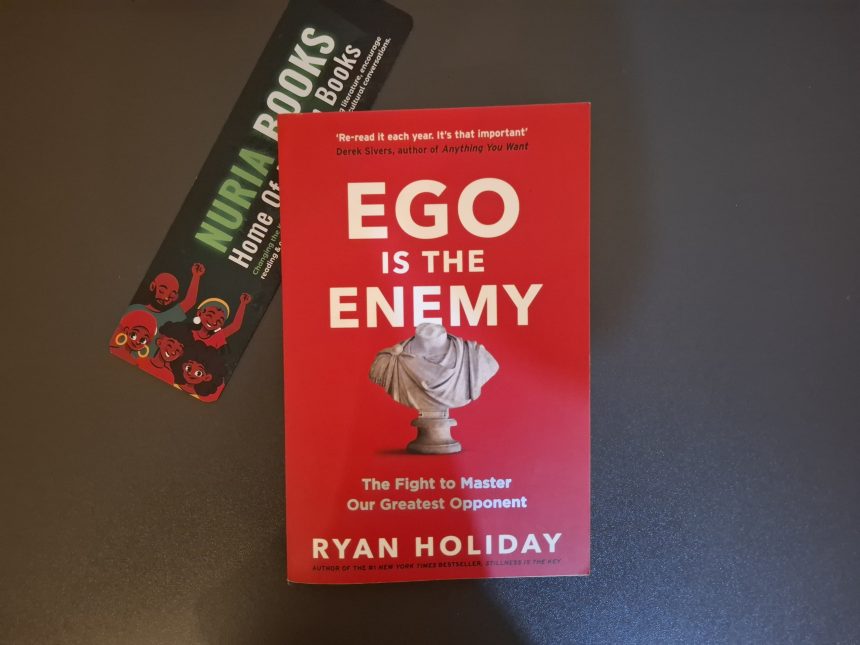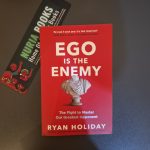Look, in all seriousness, this book has changed so many things in regard to how I operate as a human being, and I am so grateful for the impact that this book has had on my life. Writing this article, I hope to share some of that value with you today.
Quality Absolutely Demolishing Quantity
I’ve heard of this book along with the name “Ryan Holiday” so many times from a variety of sources but was a little underwhelmed by the size of it at first sight. Ultimately, I decided that it was worth a gamble.
And that ladies and gentlemen was a rare episode of me making a good decision in my life!
If anything, this book had taught me to not judge the quality of something by its size, because, within those few pages, I felt that I had leveled up in my self-awareness and my understanding of reality in a way that some significantly larger self-help books had not.
There was barely any fluff within this book, and that is something that I especially marvel at as an amateur writer who struggles with finding balance between words and their actual contributions to the text.
Each message was succinct and clear yet profound.
About The Ego…
Everyone Has an Ego
Ryan clears any confusion that people might have with the definition of ‘ego’ by clearly stating at the start of his book that he is referring to the ‘unhealthy belief in one’s own importance’.
This is very important as ‘ego’ can be interpreted in many ways. So for now, throw out all of the Freudian, or biologically correct definitions and temporarily reprogram your mind.
Everyone is to some degree self-centered and therefore in Ryan’s words, ‘your worst enemy already lives inside you: your ego’. Not to say that being a little self-centered isn’t a good thing, at the end of the day, you’re the only one that’s always going to be there for you from the start till the end, but untamed ego? Yeah, that’s gonna be a problem.
The worst part of it is, that not many are aware of this evil, flesh-eating parasite that is slowly gnawing its way out from deep within us.
But Why Do We Even Have Egos?
Well, you see, in the (sometimes) cold and harsh reality that we live in, it’s comfortable to have an unhealthy belief in our own importance.
The belief that when something goes wrong it is because of external factors is much easier to digest than to blame yourself. The narrative that we are the main characters of a movie and that something cataclysmically good will happen and change the entire course of our lives is much more comfortable than the truth that if you don’t get your asses to work that you will most likely have to suffer from the same dull lifestyle (assuming that you are unhappy with your current situation).
Ryan highlights three phases of your life that you are constantly going through and the common roles that ego plays in each: aspiring, succeeding, and failing. The layout of this book greatly helped with its practicality.
However, I won’t be getting into the specifics of those stages but rather I want to communicate a few key concepts that have personally stuck with me ever since finishing the book.
Work With Purpose Not Passion?
I have some conflicted feelings about this philosophy.
In our society, passion is promoted to us as a necessary ingredient for success.
The entrepreneurship community is often characterized (or sometimes even caricatured) as these crazy passion-driven creatures (think Steve Jobs for example).
And for a while, I had that mentality too. A deep-rooted belief of mine was that to become really good at something, you need to be obsessed with it. And even writing this article I am still having a mental debate as to whether that theory is really disproven.
Ryan argued that when you work with passion, you are operating under an irrational emotion that doesn’t allow you to view your goals with clarity. He argues that when you are working with “passion”, you are blindly pursuing something with no actual objective in mind.
He suggests instead to work with purpose which he describes as passion with boundaries which I think is valid in a sense but here’s the problem.
I think a part of what makes people like Steve Jobs or Leonardo Da Vinci the geniuses that they are is their lack of boundaries when it comes to their work.
Steve Jobs was known for his obsessiveness when it came to minuscule details about his company’s products and services, and Leonardo was said to have been so obsessed with the human anatomy that he would dissect cadavers and use his findings to inform his art and to satisfy his childish sense of curiosity.
But I feel that the main argument here is that these people, although brilliant, may not have led the most fulfilling lives.
Steve Jobs was ostracized by many due to his often extreme mood swings and petulance, and Leonardo struggled with deadlines (yes, Leo was also a procrastinator) to the point where his perfectionism led him to leave multiple contracts unfulfilled and caused him to suffer from frequent existential crises where he would lament on the fact that despite his abilities, he was not able to produce.
Whilst writing this I have concluded that geniuses are human too and therefore they all have their flaws. Perhaps, they had to sacrifice their well-being for the sake of driving the human race forward, perhaps they did not, we will never know.
The thing is, most of us do not aim to do what Leonardo and Steve did, most of us just want to lead a happy and fulfilling life.
What that means is that when it comes to your work, you need to set clear and objective goals for yourself. Passion is welcome as long you can control it rather than the other way around.
Therefore I don’t think that Ryan used the best wording when it came to naming the chapter, “Don’t be passionate”. I think that the idea of passion with boundaries is a much better way of putting it as it acknowledges that this obsession, this passion, is what drives us humans to complete virtually impossible tasks but that the execution of this passion in a way that is focused is what makes it sustainable and fulfilling.
Don’t Romanticize Your Life
This one hit me like a bus.
In the book, Ryan mentions how a lot of times in our lives, we subconsciously assume the role of the main character and inflate our egos as a result.
What Does This Entail?
A lot of people have the belief that they are better than they actually are. They believe that they will succeed, despite not doing any work. They talk on and on about their dreams and ambitions, but barely take any steps in the direction that they had said that they would reach. When they fail, they believe that the universe is somehow waiting to hand them a silver spoon and their lives will be turned around for them.
How do I know this?
Because I too used to be one of those people.
There is no point in moping around cursing the world for not treating you better. The world does not owe you anything, and frankly, it doesn’t care.
(Almost) Everything you get in your life is a product of your actions and decisions.
For example, if you are a writer on Medium, don’t think that just because you’re sad that your blog is not growing despite you putting a lot of work into it will make the universe pity you and suddenly make your account blow up. No, if you want success you have to work for it.
And when I say work, I actually mean work.
A lot of people procrastinate doing the work that actually needs to be done by doing other “work” that is more comfortable to them.
You won’t get anywhere unless you put yourself out there and make it happen for yourself as Diana Ross had said.
Always Remain a Student
The final point that I would like to make is that of always remaining a student.
This might be a scary thought to some people as it basically says that you will never truly become an ‘expert’ at something but I think that if we can reframe it in the sense that there is this treasure trove of knowledge, and each day you are presented with the opportunity to discover some of these hidden treasures, then I think that man



